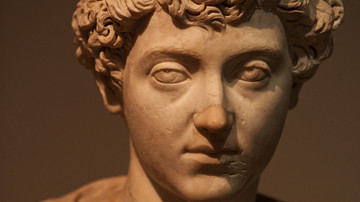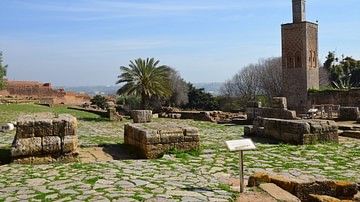Search
Search Results

Article
Roman Daily Life
From the early days of the Roman Republic through the volatile reigns of such ignoble emperors as Caligula, Nero, and Commodus, the Roman Empire continued to expand, stretching its borders to encompass the entire Mediterranean Sea as well...

Definition
Roman Egypt
The rich lands of Egypt became the property of Rome after the death of Cleopatra VII in 30 BCE, which spelled the end of the Ptolemaic dynasty that had ruled Egypt since the death of Alexander the Great in 323 BCE. After the murder of Gaius...

Definition
Roman Sculpture
Roman sculpture blended the idealised perfection of Classical Greek sculpture with a greater aspiration for realism. It also absorbed artistic preferences and styles from the East to create images in stone and bronze which rank among the...

Definition
Roman Baths
Roman baths were designed for bathing and relaxing and were a common feature of cities throughout the Roman empire. Baths included a wide diversity of rooms with different temperatures, as well as swimming pools and places to read, relax...

Article
The Ideology of the Holy Roman Empire
"The Holy Roman Empire was in no way holy, nor Roman, nor an empire," wrote Voltaire, and this interpretation still dominates the popular imagination, so the Holy Roman Empire is treated as a bad joke, a pale parody of the glory of Rome...

Article
A Roman Boy's Rite of Passage
A Roman boy's rite of passage, a ceremony or ritual marking a transitional period in life from childhood to adulthood, was the assuming of the toga virilis, the adult toga. The ceremony usually took place sometime between the boy's 14th and...

Article
Ten Ancient Rome Facts You Need to Know
Ancient Roman culture affected vast numbers of people across the known world of its time, beginning with the rise of the Roman Republic (509-27 BCE) and throughout the duration of the Roman Empire (27 BCE - c. 476 CE in the West and 1453...

Definition
Childeric I
Childeric I (r. c. 458-481) was a late antiquity king of the Salian Franks during the period of the fall of the Western Roman Empire. Childeric's reign solidified the Salians as a dominant Frankish tribe and helped pave the way for the unification...

Definition
Roman Republic
In the late 6th century BCE, the small city-state of Rome overthrew the shackles of monarchy and created a republican government that, in theory if not always in practice, represented the wishes of its citizens. From this basis the city would...

Article
Exploring Roman Morocco
Morocco, then known as Mauretania, was annexed by the Roman Empire in 40 CE. The Romans in Morocco left a vast legacy with archaeological sites that dot the country's northern landscape, especially Volubilis, with its vestiges of Roman houses...